Wooden beehives
Beekeeping in wooden beehives is an eco-friendly way to keep bees. But we also have plastic beehives; you can view this range in the category plastic beehives. The hives are mostly made from untreated wood, a renewable resource that provides bees with a healthy living environment. By using wooden beehives, you contribute to sustainable beekeeping. Moreover, wooden beehives are easy to maintain, for example by using eco-friendly paint based on natural ingredients on pine beehives. Invest in a wooden beehive and do something good for the environment and the bees. Want to buy a wooden beehive? In our online store we offer different types of beehives, such as the Simplex (double-walled) beehives, spaarkast beehives in pine or red cedar, or the Warré hive. In addition, we also have a large selection of brood box and honey super frames, such as Simplex brood box frames for the spaarkast, Belgian Simplex brood frames or Dadant Blatt Hoffmann frames. Almost all frames are available assembled or unassembled for both brood boxes and honey supers. You’ll also find matching beeswax foundation, queen excluders and entrance reducer strips. It is important to know that every beehive has its own pros and cons. Also consider the specific characteristics of the colony and your personal preferences and experience as a beekeeper before choosing a beehive. Here you can choose the wooden beehive that suits you, along with the corresponding components.
Subcategories
-
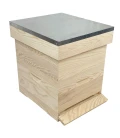
Pine spaarkast beehives
We offer a range of wooden beehives for beekeepers. In this category you’ll find pine beehives for the simplex frame size, spaarkast model. There are complete sets, in a basic version or a very deluxe version with a gable roof and a glass crown board. We have it all. Simplex frames fit both the spaarkast and the (double-walled) simplex hive. The spaarkast is a hive with two side walls that are not double-walled. A simplex hive consists of two boxes: an inner and an outer box. So with a simplex hive you have an outer shell and a separate inner box (chamber). Nowadays the spaarkast is the most widely used. In this category you’ll also find all pine beehive parts and the easy grip beehives.
-
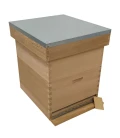
Red Cedar spaarkast beehives
We offer beekeepers several types of wooden beehives. In this category you’ll find red cedar wooden beehives for the simplex frame size, spaarkast model. Red cedar is a light, durable, and attractive wood widely used by beekeepers. You can treat red cedar with linseed oil and/or, for example, propolis, but you can also use this wood untreated. We offer complete hives as basic sets, as well as very comprehensive, premium sets, assembled with features such as a gabled roof and a glass crown board. We have several options. The simplex hive frames fit both the red cedar spaarkast and the simplex hive. A spaarkast has two side walls that are not double-walled. A (double-walled) simplex hive consists of two boxes: an inner box and an outer box. With this beehive you therefore have an outer and an inner wall. Nowadays the spaarkast is most commonly used. In this category you will also find red cedar components and red cedar easy-grip beehives.
-
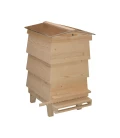
Simplex beehives
simplex beehives are characterized by the double wall. The simplex beehive has an outer casing of pine or red cedar and inner boxes made of waterproof plywood. These hives are less suitable for migratory beekeeping because they can shift slightly.
-
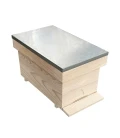
Wooden swarm boxes & 6-frame nuc boxes
A 6-frame wooden nuc box, also known as a six-frame nuc or swarm box, is a small hive that fits six simplex brood box frames. These frames are the same as the hive frames used in the spaarkast and/or simplex hive. Originally these nuc boxes were always made of wood, such as pine or red cedar, but nowadays they are also available in [category id=291]plastic, often made of EPS[/category], a type of polystyrene foam. This type of nuc box is ideal for housing a small colony, for example a swarm or a split. Or for building up a small colony. Thanks to its compact dimensions the nuc box is easy to transport, making it an indispensable piece of beekeeping equipment. Many keep one in their car for catching swarms.
Other uses of the six-frame nuc
The box is also used in pollination, for making a split or a shook swarm, or for housing a reserve colony on a few frames of bees via, for example, the Aalster method, a technique for creating artificial swarms.
Protecting the wooden six-frame nuc
We always recommend priming and painting wooden nuc boxes to protect them from moisture. This prevents moisture from wicking in through the outside of the box. Preventing this makes the boxes last much longer. Wood is sensitive to moisture and can therefore expand or shrink. A coat of paint forms a protective barrier. In our range you’ll find a wide selection of 100% natural [category id=134]paints[/category] that provide optimal protection for the exterior of a wooden hive. For extra protection you can also treat the inside of the box with [product id=1528]propoleum[/product]. This also helps extend the life of the hive.
History of the wooden six-frame nuc
Historically, the box was developed in England to make it easy to transport small swarms during a period of bee scarcity. In this period many colonies, including Dutch ones, were exported to England. The small size of the box, just large enough for one colony, was particularly useful then. The box never disappeared and is still widely used today.
-
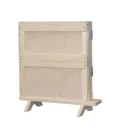
Demonstration- & observation hives
Demonstration hives are great for observing bees. This type of hive is also known as an observation hive. As a beekeeper, you can easily take your bees to a fair or market. Guaranteed to attract many visitors to your stall—and hopefully boost honey sales too!
-
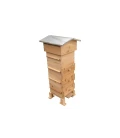
Warré beehives
The Warré hive is ideal for the beginner beekeeper, as it requires little start-up equipment. The Warré hive originated in France and was developed by Émile Warré to make beekeeping simple with minimal intervention with the bees. Émile Warré developed the hive in the early 20th century to counter the declining number of beekeepers in France. In this category you will find our full range of Warré hives and accessories.
-
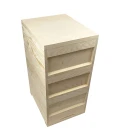
Zander wooden beehives
The wooden Zander beehive from BeeFun® is a beehive of exceptionally high quality, made from beautiful pine wood. This Zander beehive, also known as Zanderbeute, is an innovative, purpose-built hive designed for keeping honey bees. A Zander beehive can be made of wood or polystyrene. In this category you will find the wooden version; the plastic Zander beehive has its own category. The hive consists of 2 or 3 removable sections: the top is the honey super and the bottom is the brood box (brood chamber). One of the key innovations at the time was that the honey super, including the roof, could be removed, allowing the underlying brood box (brood chamber) to be inspected.
-
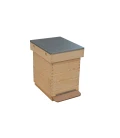
Langstroth hives
Langstroth hives are identical to the standard hive, except for the size. But in the 19th century it was the first hive to incorporate bee space throughout. This was the invention of Lorenzo Lorraine Langstroth. An important innovation that we now find not only in the Langstroth hive but also in 'our' simplex hives. It was also the first hive in which the hive frames could be easily removed from the hive. In this category you will find double-walled, single-walled and polystyrene Langstroth hives
-
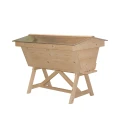
Top Bar Hive (TBH)
The Top Bar Hive (TBH) is a beehive without the usual honey and brood frames. The hive uses only top bars, on which the bees draw their own comb. This makes the hive ideal for beginner beekeepers, as they can get started without much equipment or other investment. A notable feature of this hive is its sloped sides. The sloped sides help prevent the bees from attaching the comb to the hive walls. The TBH is also widely used in Africa thanks to its simple construction and minimal tool requirements.
-
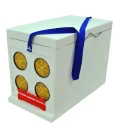
Bee transport
Sometimes it's useful to quickly transport a complete colony or a swarm. This can be done easily in, for example, a multibox.
-
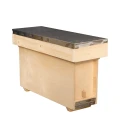
Three-frame nuc boxes (spaarkast/simplex)
Three-frame nuc boxes are widely used in queen rearing in combination with a starter. This is an extra compartment where queen cells can be placed. A three-frame nuc is also very handy for housing spare queens or for moving hive frames between apiaries.
-
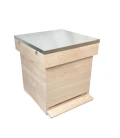
simplex double-walled 46 x 46 (Belgian)
The Simplex spaarkast is a beehive in the Belgian Simplex size, double-walled (i.e., the front and back are double-walled). This means these beehives have external dimensions of 46 cm x 46 cm and are designed to hold eleven hive frames. Thanks to the double outer wall at the front and back, the Simplex beehive is better insulated. Better insulation helps spring build-up start faster.
-
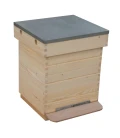
Kempische beehives
The Kempische beehive measures 49.7 cm x 44 cm and is "double-walled", meaning this hive has extra-thick walls. In this category you can find our Kempische range.
-
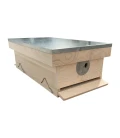
Top bar beehive
-
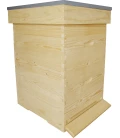
Dadant US beehives
Looking to buy a new beehive? Then be sure to consider a Dadant beehive, such as the Dadant-Blatt or the Frankenbeute Dadant US. A Dadant US or Dadant US beehive, with its spacious design and proven efficiency, can be a valuable investment for any beekeeper, whether you’re just starting out or have kept bees for years.
Hives in the Dadant US size are designed so the colony can be maintained on a single brood box (brood chamber). One or two honey supers are then often added above the colony. The footprint of the brood box (brood chamber) and honey super is 50.9 x 50.9 cm. A Dadant US beehive holds 12 hive frames. You can choose to position the frames using spacing strips, or hang them 'loose' in the hive using Hoffmann frames. (It is also possible to work with 10 frames.) -

German Normal beehives
-
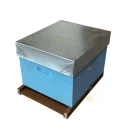
Dadant Blatt bijenkasten
-
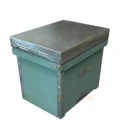
Layens bijenkasten
How many wooden beehives do I need for my apiary?
How many brood boxes and honey supers you need per beehive depends on the colony’s growth and size. As the colony builds up, you add boxes, and after the honey harvest the honey supers are removed again. Depending on colony strength, hives are usually overwintered with 1 or 2 brood boxes. In general, it’s advisable to keep multiple colonies/hives. The saying “One colony is no colony” is often used to stress that if you’re unlucky and lose a colony, you have nothing left to keep beekeeping with. That’s why it’s recommended to go into winter with at least two hives where possible. It’s also important to become confident with hive management and learn the tricks of the trade. By taking a course and being mentored for a season by an experienced beekeeper, you learn to read the specific characteristics of different colonies. With that experience, you can decide how to set up and manage your apiary.
What’s the difference between wooden beehives and plastic beehives?
Wooden beehives are made from natural, often untreated wood. Both types provide bees with a suitable habitat. Plastic beehivesare generally lighter to lift and easier to maintain. Based on your needs, you choose between a wooden beehive or a polystyrene (plastic) beehive. Weigh up what matters to you and which hive suits you and your colony best.
Why choose a wooden beehive?
In nature, a honey bee colony typically nests in a hollow tree or another cavity such as a chimney. A brood box in a beehive is an excellent substitute for such a natural cavity. A hive can be monitored more easily by the beekeeper and protects the bees against various weather conditions. The wooden hives from the Imkershop are made from quality wood. Pine hives are best maintained by priming and finishing them with our natural paint or treating them with propoleum to ensure a long service life. Red cedar and Thermowood can be used unpainted.
Want to expand a hive or replace a component? All parts can also be ordered separately via our webshop.
